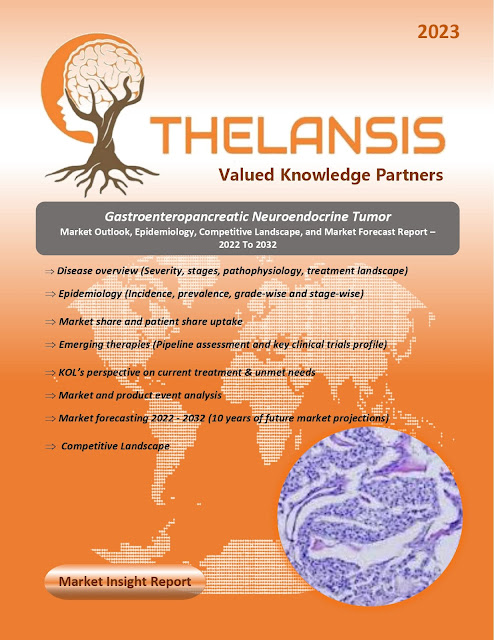Gastroenteropancreatic Neuroendocrine Tumor – Market Outlook, Epidemiology, Competitive Landscape, and Market Forecast Report – 2022 To 2032
Gastroenteropancreatic neuroendocrine tumors (GEP-NETs), also known as (carcinoids and Islet cell tumors), Carcinoid tumor are a rare form of neoplastic disease arising from primitive stem cells in the gut wall, particularly in the appendix. They can also be found in other organs, such as the lungs, liver, pancreas, and kidneys. These tumors are of neuroendocrine origin and can secrete humoral factors, including polypeptides, vasoactive amines, and prostaglandins, resulting in a hormonal syndrome. The symptoms of this hormonal syndrome include increased bowel movements, diarrhea, vasoactive flushes (especially of the face), hypotension, tachycardia, venous telangiectasia, dyspnea, and bronchospasms. In addition, the long-term effects of this condition may lead to fibrotic changes in the mesentery, retroperitoneum, and cardiac valves. Carcinoid tumors are classified based on location in the primitive gut that gives rise to the tumor, including foregut, midgut, and hindgut carcinoid tumors. These tumors are further divided into well-differentiated (low and intermediate grade) and poorly differentiated (high grade) categories based on their level of differentiation.
·
Carcinoids are the most common neuroendocrine
tumors, with an estimated incidence of 1.5-1.9 cases per 100,000 individuals in
the United States.
Thelansis’s “Gastroenteropancreatic Neuroendocrine
Tumor Market Outlook, Epidemiology, Competitive Landscape, and Market Forecast
Report – 2022 To 2032" covers disease overview, epidemiology, drug
utilization, prescription share analysis, competitive landscape, clinical
practice, regulatory landscape, patient share, market uptake, market forecast,
and key market insights under the potential Gastroenteropancreatic
Neuroendocrine Tumor treatment modalities options for eight major markets (USA,
Germany, France, Italy, Spain, UK, Japan, and China).
KOLs insights
of Gastroenteropancreatic Neuroendocrine Tumor across 8 MM market from the
centre of Excellence/ Public/ Private hospitals participated in the study.
Insights around current treatment landscape, epidemiology, clinical
characteristics, future treatment paradigm, and Unmet needs.
Gastroenteropancreatic Neuroendocrine
Tumor Market
Forecast Patient Based Forecast Model (MS. Excel Based Automated
Dashboard), which Data Inputs with sourcing, Market Event, and Product Event,
Country specific Forecast Model, Market uptake and patient share uptake,
Attribute Analysis, Analog Analysis, Disease burden, and pricing scenario,
Summary, and Insights.
Thelansis Competitive Intelligence (CI) practice
has been established based on a deep understanding of the pharma/biotech
business environment to provide an optimized support system to all levels of
the decision-making process. It enables business leaders in forward-thinking
and proactive decision-making. Thelansis supports scientific and commercial
teams in seamless CI support by creating an AI/ ML-based technology-driven
platform that manages the data flow from primary and secondary sources.

Comments
Post a Comment